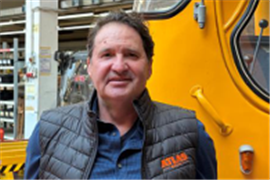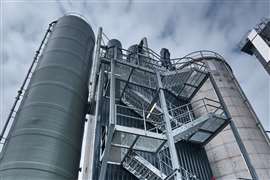Terex Trucks one year on
06 August 2015

As acquisitions in the construction equipment industry go, Volvo’s purchase of Terex’s hauler business, announced in December 2013, was an interesting one. Rigid haulers were missing from Volvo’s portfolio, and they looked like a good fit with the excavators and wheeled loaders the company supplies to mines and quarries around the world.
More perplexing was the reason for adding the Terex articulated dump truck (ADT) range to the family. Surely this would compete with Volvo’s own ADTs, which cover the same weight classes and applications?
But from the outside Volvo has been adamant that its own brand of ADTs and Terex’s machines were at different ends of the market. It was something Terex Trucks global director of sales & marketing, Sam Wyant, reinforced during iC’s visit.
“We see the benefit of a standard feature set product, or you could say a value feature set product. We have noticed that with a few sister brands in the Volvo Group, but particularly with SDLG in the construction equipment world. You see those products being better accepted in certain markets than the premium products. The Terex Trucks product plays nicely into that.”
“We certainly see more of an opportunity in the Americas, Asia Pacific and areas like Africa where we can leverage that strategy. It also seems to be a great strategy to deploy for rental businesses, where their requirements are not always as high. We have the feature set they are looking for,” he said.
And according to Mr Wyant, rental is an increasingly important channel for its ADT sales, particularly with global demand for haulers looking weak this year in the face of low commodity prices
“In the articulated hauler business it (rental) really has grown,” he said. “We see a higher percentage of rentals than we have in the past. Customers are looking to either use rental fleets or to take advantage of off-balance sheet financing. That has become the majority of the market in America, where the first use of these units is in some sort of rental environment.”
“I don’t see that being a trend that changes dramatically in the future. A lot of companies are looking for confirmation in the market that they have enough backlog before they buy an asset like an ADT. It seems when customers do have the backlog they are more willing to make the acquisition.”
So Terex ADTs have a future under Volvo’s ownership, and Mr Wyant said there is also a will to develop them further. “The good thing about being part of Volvo is the willingness to invest and bring the products forward,” he said.
But he acknowledged there is also a balance to be struck between adding features and keeping the ‘no frills’ approach which Volvo has identified as part of the core appeal of the Terex Trucks range of both rigid and articulated machines.
“We have processes in place to make sure we define the key criteria,” he said. “For us we look to be a durable and reliable machine with simplistic operation. It’s also something that is pretty gritty. It’s a machine that is aggressive, with very good gearing to allow us to pull on slopes. Those are key attributes we want to keep on our products.”
One year on
The most visible changes since Volvo acquired Terex Trucks have been a string of dealer appointments, and the company has also launched a website in conjunction with Machinery Trader for dealers to advertise used trucks for sale – www.terextrucksused.com
But Mr Wyant said there had been a lot of activity in some more subtle areas. “There is a lot of work behind the scenes to strengthen those relationships with the dealers, how we go about business planning, how we go about marketing and aftermarket support with the dealers in a much stronger way. That is something the Volvo Group does bring to the table with systems and processes.
“We’ve made hires to reinforce our sales structure and marketing team, and continue to put ourselves in a position to support the distribution and our customers in a better way. That was one of the key things since the acquisition was to put some of the key pieces in place to support the customers and become the specialist. That is really how we see ourselves in the marketplace – the specialist and the expert for off-road truck solutions,” he said.
But there is no getting away from the fact that the off-highway truck business is a challenging one this year. Mines are key end-users, particularly for rigid haulers, and with global commodity prices remaining weak, there is neither the confidence nor the will to invest in new machines.
According to specialist consultancy, Off-Highway Research, the global market for ADTs and rigid trucks was worth US$ 6.9 billion last year – US$ 4.2 billion for rigid haulers and US$ 2.8 billion for ADTs.
But while demand for ADTs has improved since the global financial crisis, rigid truck sales have continued to slip. Off-Highway Research says that in 2010, global unit sales for these trucks came to 5,111 units, but last year that figure stood at 3,651 machines – that is a fall of almost -30% in rigid hauler sales in four years, and a further decline is likely in 2015.
According to Mr Wyant, Terex Trucks’ customers still look like they are keeping busy, but he concurred that investment decisions were being put off.
“We have seen fairly good utilisation of parts. Our aftermarket business has maintained its strength and is doing quite well. The good news with that is the fleets are being utilised. The customers are using the machines they have, which means they will have to replace them. Until the commodity prices come back, they are using the fleets they already have and they are wearing them out, so they will have to re-fleet at some point in time.”
“We know it’s coming, because we can see the utilisation on the machines and we see customers using their fleets, and we know commodity prices will rebound. It’s just difficult to put the timing on it. For us it’s more about scenario planning,” he said.
So besides a market rebound to lift the spirits, what other changes will we see at Terex Trucks a few years down the line?
“You will continue to see the evolution and working with our dealers to strengthen our position in the marketplace, and strengthen our relationship with the end users,” said Mr Wyant. “You would see some changes in the products and how we approach those. You would also see some changes in the facilities here and our working environment.”





